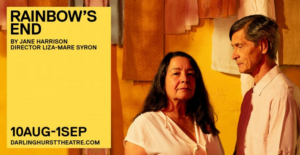Review: RAINBOW'S END Celebrates The Power Of Women While Presenting The Australian Aboriginal Story With Honesty And Humour

Wednesday 14th August 2019, 7:30pm, Eternity Playhouse
Based in truth Jane Harrison's RAINBOW'S END gives audiences an insight into the Aboriginal Australian story and their fight for recognition and equal rights. Director Liza-Mare Syron has gathered three strong Aboriginal women to present the story of three generations of Yorta Yorta women for Darlinghurst Theatre Company's collaboration with Moogahlin Performing Arts.
Starting in 1954 at the time of Queen Elizabeth II's Australian tour visited Shepparton-Mooroopna, a Victorian town that straddles the Goulburn River, RAINBOW'S END follows the lives of matriarch Nan Dear (Lily Shearer), her daughter Gladys (Dalara Williams) and granddaughter, Gladys' daughter high school student Dolly (Phoebe Grainer). With Nan's husband working away as a Priest and Gladys widowed from the second world war, the three women navigate life in their corrugated iron home in the makeshift settlement on the banks of the river where they get flooded out any time the river rises, freeze in winter and swelter in summer heat. Nan values family and wants the best for Gladys and Dolly but has a pragmatic view of the world, being well aware of the prejudice which has held Aboriginal communities back while trying to protect Dolly as best she can and believing that Dolly's future will be like her's and Gladys' working as a picker in the neighboring farms. Gladys is an optimist who enjoys listening to radio quiz shows and hopes for a better future for her daughter where Dolly will be educated and work in Shepparton, not in the farms. Dolly is stuck between her grandmother and her mother's expectations whilst trying to navigate high school, the prejudice from her schoolmates, and young love with the naive Britannica Encyclopedia sales rep Errol (Lincoln Vickery).
The title RAINBOW'S END comes from Aboriginal word for Rainbow, Rumbalara, after which the government-built housing which the Dear family and the Aboriginal community were moved too. With a strong female voice, RAINBOW'S END draws on the Aboriginal women's role in petitioning government for recognition of Aboriginal people and fair treatment. This work has a gradual build, allowing the audience to get a sense of the challenges these women, and by extension, the wider Aboriginal community face, before Gladys' rousing final speech. For opening night, there was perhaps a degree of nerves causing a somewhat uneven presentation but thankfully they eased somewhat by the end of the 75-minute story. Shearer gives Nan a firm oversight of the family while also giving a hint to hidden secrets. Williams is presents Gladys with a bright positive nature which allows for a powerful shift when she decides to take a more proactive approach to both her own and her community's future. The standout performances come from Grainer and Vickery. Grainer expresses the familiar stubbornness of adolescence but ensures that it is blended with the respect of family and an understanding that, regardless of how smart she is, most people will judge her for her heritage resulting in a surprise and caution when Errol shows interest in her. As Errol, Vickery shows the hope for non-indigenous and specifically white Australian respect and acceptance of Indigenous people through his expression of an honest innocence and ignorance of why Dolly is reluctant to go out with him and his persistence to understand Dolly's values. Other characters, ranging from a Bank Manager, police officer, rent collector and housing inspector, are presented by Frederick Copperwaite who ensures that each character is distinct even if their presence is only minimal.
Australian theatre needs stories from all facits of it's population and the stories need to be written and told by the people that own the stories and this production of RAINBOW'S END does that. With four of the cast, the director and playwright being of Aboriginal descent, this production has an honesty and truth which each infusing the work with their own understanding of their culture and ensure that the audience sees a presentation of Australia's First Nations people that shows their resilience, and determination without the bad stereotypes usually lined to Australian Aboriginal communities. RAINBOW'S END is an important piece of theatre that shows not only how far society has come in treating Aboriginal people properly but also a reminder that there is still a way to go.
https://www.darlinghursttheatre.com/whats-on/rainbows-end
Comments
Videos

